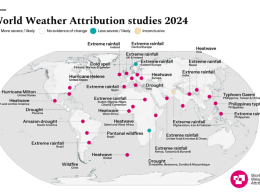Carbon removal firm Climeworks has signed an agreement with Japanese shipping giant Mitsui O.S.K. Lines (MOL) to extract 13,400 tonnes of carbon dioxide from the atmosphere by the end of the decade. This marks Climeworks’ first collaboration with a partner from the global shipping sector.
Alongside the carbon removal offtake deal, the companies have signed a Memorandum of Understanding outlining potential future investment by MOL in Climeworks’ forthcoming Direct Air Capture (DAC) facilities. Climeworks is developing a global portfolio of DAC projects, with the aim of scaling to million-tonne carbon removal capacity by the 2030s.
The agreement aligns with MOL’s broader climate strategy to achieve net-zero emissions by 2050, in accordance with the International Maritime Organization’s climate goals. The company has pledged to contribute 2.2 million tonnes of carbon removal by 2030 as part of its emissions reduction strategy, which includes operational efficiency improvements and clean energy adoption.
The shipping industry is considered one of the hardest to decarbonise due to technological and logistical constraints. While other sectors, such as automotive, have feasible low-emission alternatives like electric vehicles, large-scale cargo shipping continues to rely heavily on fossil fuels. As a result, carbon removal technologies are seen as essential to addressing residual emissions in this sector.
MOL is also Climeworks’ first customer from Japan, reflecting Japan’s growing involvement in the carbon removal market. In April 2024, Japan became the first country to include international, durable carbon removal credits—such as those issued through Climeworks’ DAC process—in the initial phase of its national emissions trading system.
The partnership adds to growing international demand for long-duration carbon removal as part of broader decarbonisation strategies. Climeworks and MOL plan to support the expansion of the carbon removal sector while contributing to emissions targets in hard-to-abate industries.
















